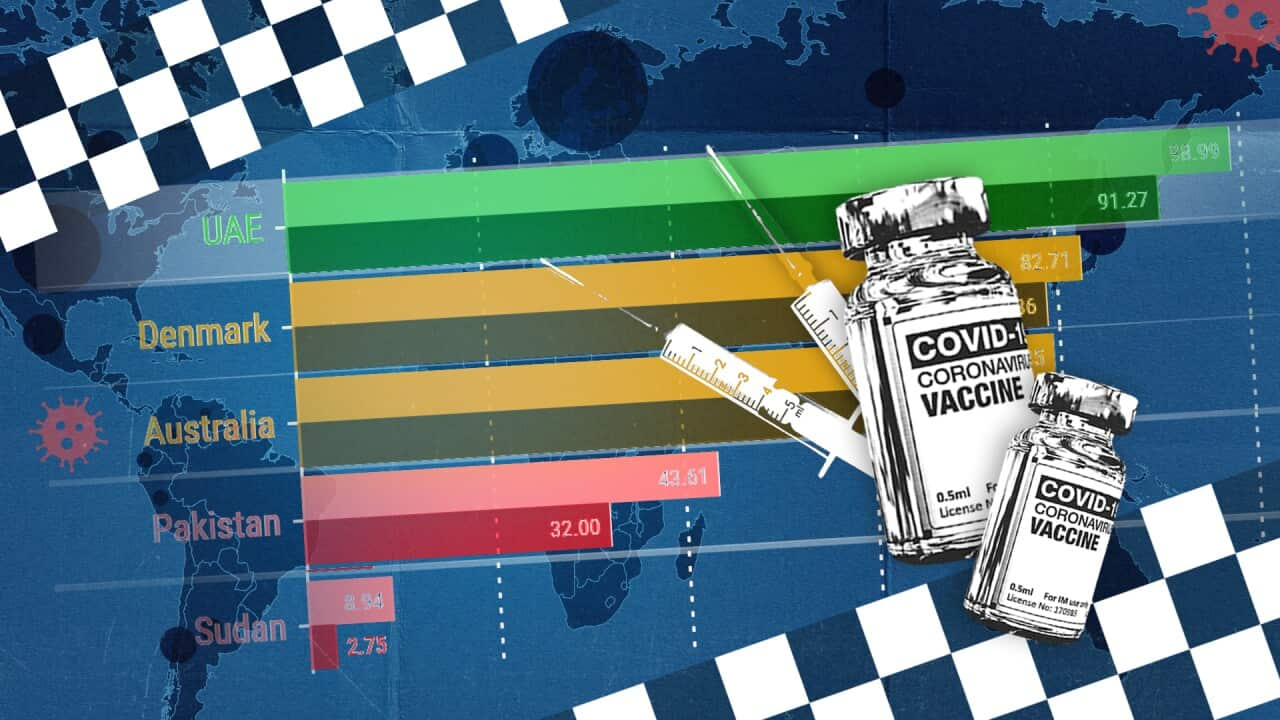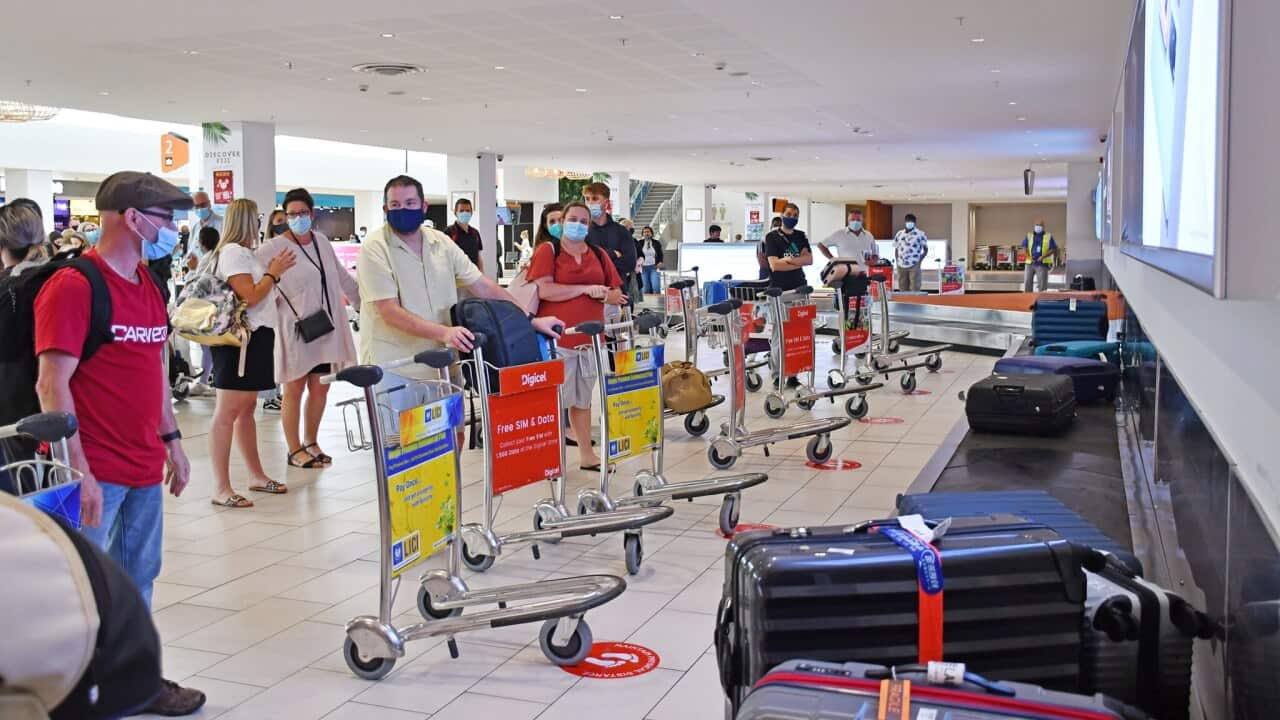After months of lockdown, Sunday mass is back in Serea village. The Nadoloi clan are able to gather again safely thanks to high COVID-19 vaccination rates in the community.
Around 90 per cent of adults here have received both doses, according to locals - an enormous feat in a village where conspiracy theories ran rampant only a few months ago.
Dairy farmer Seruwaia Kabukabu told SBS News a lack of information and connectivity in the remote area - on the outskirts of Suva - are key reasons why many were initially hesitant, as well as being shared on social media.
"Everyone is on Facebook, everyone is sending messages around saying if you have the vaccine you get metal inside your blood, if you have the vaccine you will be tracked.
"Hearing the stories, we know that we want to move on, we don’t want to have lockdown for all of our lives." Ms Kabukabu is the secretary of the Naitasiri Women in Dairy. The organisation was set up in 2017 by a group of women dairy farmers to share farming knowledge, issues, challenges and experiences encountered in a traditionally male-dominated industry.
Ms Kabukabu is the secretary of the Naitasiri Women in Dairy. The organisation was set up in 2017 by a group of women dairy farmers to share farming knowledge, issues, challenges and experiences encountered in a traditionally male-dominated industry.

Dairy farmer Seruwaia Kabukabu. Source: SBS News/Abbie O'Brien
Recognising the community's reluctance to get the jab, the women coordinated a vaccination drive with the assistance of the Ministry of Health. Ms Kabukabu offered up her home as the location for the clinic.
They were able to provide transportation through Australian Government funding, with Ms Kabukabu educating the community on the benefits of the vaccine in the lead-up to the clinic.
"We were telling everybody that the vaccination drive will be held here, we will be having the transport come over to your door, to [pick up] your families and whoever else wants to come.
"[We told them] if you get vaccinated everything will be open up to you, you can go to the market, the borders will be open, you can go to the supermarkets, everybody wants to be safe." Now, Ms Kabukabu is hoping to host a clinic at her home for child vaccinations.
Now, Ms Kabukabu is hoping to host a clinic at her home for child vaccinations.

This church in Serea village in Fiji hosted a COVID-19 vaccination drive. Source: SBS News/Abbie O'Brien
"We are planning to have a vaccination drive to help out the parents and to get all kids vaccinated."
The vaccination rollout in Serea village is part of a wider campaign that has taken place across Fiji to ensure the nation is well protected against COVID-19.
For months, medical teams trekked to remote communities in far-flung corners of the country.
Fiji is hoping to build on high vaccination rates among adults, with its sights now set on child vaccinations.
"We’ve achieved quite high vaccination rates with our normal vaccination program. Now we want to achieve the same with children," Dr James Fong, Fiji's permanent secretary at the Ministry of Health, told SBS News.
Dr Fong, who has been spearheading Fiji’s COVID-19 response, said 60 per cent of children aged 15-17 have already had two vaccinations, while the rollout for those aged 12-14 launched over the weekend.
"Our population demographic has a big number of young people and so we are ensuring we can get our vaccinations down to at least age 12, which will ensure we will get well beyond two-thirds of the population vaccinated," he said.
Among other Pacific island nations, Fiji is looking to be a leader, with Papua New Guinea, Vanuatu and the Solomon Islands all lagging well behind with fewer than 30 per cent of all residents fully vaccinated.
In Australia, as of 5 December, 68 per cent of children aged 12-15 had been fully vaccinated. National medicines regulator the Therapeutic Goods Administration (TGA) on Sunday provisionally approved the Pfizer COVID-19 vaccine for children between the ages of five to 11, with the rollout expected to begin in January pending further approvals.
New Zealand, which has fully vaccinated 72 per cent of its population, is also looking to begin vaccinating children aged five to 11 in January.
Vaccination drives have been taking place at schools across Fiji. Nurse Vacisevea Vuku, who has been administering the jab to students, says initially some parents were hesitant, but now the clinics are packed with families.
"When it began there was low turnout but now it's increasing. Once the children knew the side effects are minimal, that we haven't received any serious side effectS, the children are coming in large numbers," she told SBS News. At a clinic in Suva, Matai Akauola explains why he brought his two grandchildren along for the vaccine.
At a clinic in Suva, Matai Akauola explains why he brought his two grandchildren along for the vaccine.

Taia Ivini getting vaccinated at a clinic set up at Nehru Primary School in Suva. Source: SBS News/Abbie O'Brien
"WIth the different variants coming to the nation, we need to be prepared," he said.
His granddaughter Taia Ivini says both she and her family are thrilled to know she is now protected.
"I’m excited. It’s good because now, parents know that their kids are safe and they can go places."












